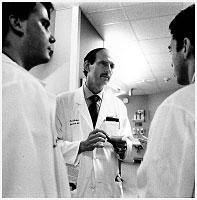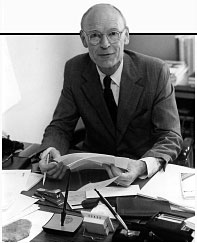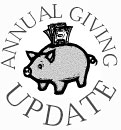Dartmouth-Hitchcock Medical Center Development
Knights in shining armor
By Sandy Adams
A new fund aimed at enhancing the quality of medical teaching within the clinical setting was recently established at Dartmouth Medical School by anonymous donors. A gift of $1 million has created the Thomas P. Almy Clinical Scholars Fund, in honor of Thomas Almy, M.D., an emeritus member of the DMS faculty and a mentor to many physicians who have studied and trained at DHMC.
As private insurance companies and the federal government's Medicare and Medicaid programs have sought to curtail expenditures, they have been increasingly unable—or perhaps unwilling—to continue providing support for the teaching that goes on within academic medical centers like Dartmouth- Hitchcock. As a result, academic physicians are being asked to see more patients in the same amount of time, while still teaching medical students and residents at patients' bedsides.

|
|
Photograph by Flying Squirrel Graphics |
|
The sort of on-the-ward and in-the-clinic teaching exemplified by the scene at the top will be furthered significantly by a new endowment named in honor of Thomas Almy, below, the emeritus chair of medicine. |

|
|
Steve Adams |
Discouraged by these recent changes in the health-care environment and their detrimental impact on the faculty who are responsible for both caring for patients and training the next generation of physicians, academic medical center administrators have been seeking ways to stabilize the clinical teaching model. There is a direct correlation between the quality of training future physicians receive in clinical settings (the patients students see under these circumstances serve as living seminars, teaching as much about life and health as about illness and death) and the quality of health care patients will receive in the future.
"Confidence in the academic process is dependent upon allowing medical judgment to grow in young people," observes Dr. Almy himself. "And that takes time. You can't hurry that."
|
Private philanthropy may be the "knight in shining armor" for DHMC and the nation's other academic medical centers as they struggle to deal with this fast-changing and threatening financial situation. The anonymous donors who created the Almy Clinical Scholars Fund, sympathetic observers of the med ical education landscape, recognized precisely how to begin easing the pressure felt by faculty-physicians engaged in the clinical learning experience.
The Almy Clinical Scholars Fund is the largest of three funds devoted to sustaining the learning relationship that exists between faculty physicians and their students and residents. The Almy Clinical Scholars Fund will support clinical teaching at DHMC in Lebanon, N.H., while the Thomas C. Chalmers, M.D., Community Teacher Endowment Fund and the William N. Chambers Faculty Award support the work of community preceptors who teach students at practices throughout the region.
The income from the Almy Clinical Scholars Fund will go towards support for faculty salaries within the Department of Medicine—the largest clinical department at DHMC. A small portion of the income will be used to underwrite 10 percent of a junior faculty member's time for bedside teaching. The rest will allow a senior faculty member to put extra time and effort into teaching, as well as into developing new clinical teaching programs. The appointment of the Almy Clinical Scholar will be made on a rotating basis, with a new scholar named every three years by the chair of the Department of Medicine in collaboration with the dean of the Medical School.
Harold Sox, M.D., the chair of medicine, is excited by the prospect. "The endowment that supports the Almy Teaching Scholar is one of the largest and most important gifts we've ever received," he says. "I hope that the Almy Teaching Scholar proves to be the first of many endowed positions that further the department's education mission. A gift that endows teaching means that, regardless of the pressures of clinical practice, Dartmouth medical students will have a teacher dedicated to their needs . . . forever."
Naming and modeling the Almy Fund after the professional life of Thomas Almy was a fitting and compassionate tribute to a man who helped to shape much of what's best about primary-care teaching and patient care at Dartmouth. Almy was recruited to DMS as the chair of medicine in 1968, just as the School was in the process of reinstituting a full M.D. program for the first time since 1914. He also held the Nathan Smith Chair of Medicine, an endowed professorship named after the founder of Dartmouth Medical School. In that dual role, he created opportunities for clinical teaching at a critical time in DMS's history. Caring for the "whole patient"—physically, socially, and psychologically—has been one of Almy's life-long endeavors. The strength of DMS's academic fabric is due in part to Dr. Almy's many contributions. For example, he proposed, instituted, and taught—together with Michael Zubkoff, M.D., chair of community and family medicine—a required fourth-year course called Health, Society, and the Physician, which integrates social and humanistic elements within a case-study approach to medicine.
"Dr. Almy was the chair of the department when I was the chief medical resident," recalls the current chair, Hal Sox. "He shaped the department into the form that it has today: a very productive blend of clinician-educators and clinician- scientists. As a distinguished clinician-scientist and a great teacher, Dr. Almy was the right person at the right time for Dartmouth Medical School. I am only one of dozens of physicians who think of him as their most important mentor, inspiration, and role model."
Almy was recognized as a national expert in gastroenterology and a skilled teacher when he came to DMS from Cornell. He has also served on numerous national and international committees and on the editorial boards of many journals.
Since his 1985 retirement as an emeritus professor of medicine and of community and family medicine, Dr. Almy and his wife, Katharine W. Swift, M.D., also an emeritus member of the DMS faculty, continue to contribute to the vitality of the Medical School and the Medical Center. For example, just a few years ago he conceived of and implemented a program that pairs up DMS students and residents at Hanover's Kendal retirement community. And he has also been instrumental in bringing to Kendal speakers and programs that offer insights into DMS.
Although most of today's medical students may not know Almy, they have more opportunities to learn primary care and ambulatory care, thanks in large measure to his early—and continuing— efforts. And thanks to the "knights in shining armor" who established the fund bearing his name.
Healing is a matter of time, but it is sometimes also a matter of opportunity.
— Hippocrates
First Almy Scholar named
 DHMC's first Almy Clinical Scholar was selected just at press time.
Holding the post for the next three years will be Richard Whiting,
M.D. (below), a member of the section of general internal medicine
since 1975 and section chief from 1989 to 1996. His clinical and
teaching interests are in the area of geriatrics.
He was instrumental in creating an ambulatory
geriatrics program, for example, to enable
older patients to remain at home by improving
or maintaining their functional capabilities.
"Dick Whiting was the leader of the general
internal medicine faculty at the Lebanon campus
for eight challenging years," notes Harold
Sox, M.D., chair of the Department of Medicine.
"Under his direction, the faculty reorganized its clinical-care programs,
expanded its commitment to the education programs, and
assumed a position of leadership in the School and the Medical
Center." Referring to Whiting's geriatrics expertise, Sox adds, "I
expect him to use his organizational and teaching skills to take our
geriatric teaching programs to the next level." Whiting earned his
M.D. at Cornell and did his residency in internal medicine as well as
a fellowship in hematology-oncology at the University of Virginia.
DHMC's first Almy Clinical Scholar was selected just at press time.
Holding the post for the next three years will be Richard Whiting,
M.D. (below), a member of the section of general internal medicine
since 1975 and section chief from 1989 to 1996. His clinical and
teaching interests are in the area of geriatrics.
He was instrumental in creating an ambulatory
geriatrics program, for example, to enable
older patients to remain at home by improving
or maintaining their functional capabilities.
"Dick Whiting was the leader of the general
internal medicine faculty at the Lebanon campus
for eight challenging years," notes Harold
Sox, M.D., chair of the Department of Medicine.
"Under his direction, the faculty reorganized its clinical-care programs,
expanded its commitment to the education programs, and
assumed a position of leadership in the School and the Medical
Center." Referring to Whiting's geriatrics expertise, Sox adds, "I
expect him to use his organizational and teaching skills to take our
geriatric teaching programs to the next level." Whiting earned his
M.D. at Cornell and did his residency in internal medicine as well as
a fellowship in hematology-oncology at the University of Virginia.

Annual Giving Update
By Lisa Webster-Drucker
Acting Director of Annual Giving
Dartmouth Medical School Annual Fund: The DMSAF's fall student phonathon was a great success this year. Thanks to those of you who made gifts and pledges, our volunteer student callers were able to raise almost $77,000 for the School. These gifts will go to work immediately, providing academic scholarships, supporting training and vital research, and improving and expanding a variety of programs. Please remember—if you've made a pledge to the Annual Fund, the contribution must be received by June 30, 2000, in order for the gift to be counted in this year's campaign.
Dartmouth-Hitchcock Annual Fund: As I write, we are four months into this year's campaign and are making steady progress toward breaking last year's record total of $607,313! Let me take this opportunity to thank those of you who have already made generous contributions. Some of you may have inadvertently received an additional mailing from the Annual Fund this fall. We apologize for this inconvenience and are working hard to avoid this kind of problem in the future. If you have any questions, or would like more information about making a gift to the Dartmouth- Hitchcock Annual Fund, please call 603/650-4042.
Sandy Adams is a contributing editor of DARTMOUTH MEDICINE magazine.
